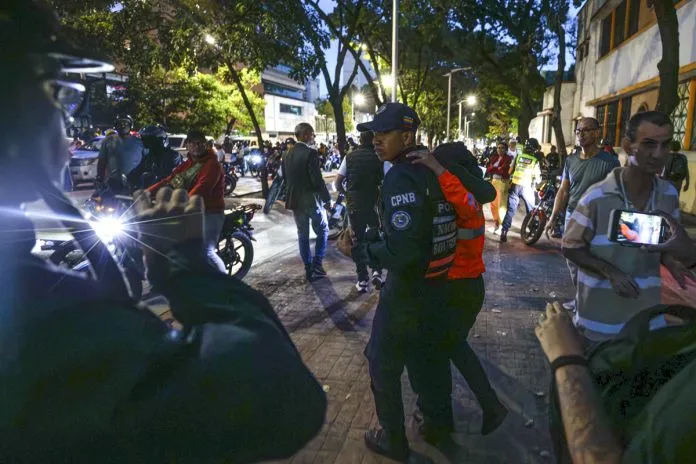Introduction
In the wake of the recent Venezuelan presidential election, which saw Nicolás Maduro declared the winner for a third consecutive term, a wave of protests has erupted across various cities and towns in Venezuela. This article delves into the widespread demonstrations, the reactions from different communities, and the broader implications of these events. The protests reflect deep-seated discontent with the election process and outcomes, as citizens express their frustrations through various forms of public dissent.
Protests and Public Outcry
Massive Protest in Caracas
On Monday, the Venezuelan capital, Caracas, witnessed an unprecedented outpouring of public dissent. A large-scale protest, characterized by the traditional Venezuelan practice of banging pots and pans known as a “cacerolazo,” took place across several neighborhoods. This form of protest is a significant and symbolic way for Venezuelans to voice their dissatisfaction.
Areas Affected
The cacerolazo resonated through multiple areas of Caracas, including Petare, Altamira, Chacaíto, Bellas Artes, La Vega, El Valle, Catia, and La Candelaria. These neighborhoods are known for their vibrant communities and, in this case, their collective resistance to the electoral results.
In addition to Caracas, protests were reported in other parts of Venezuela. In the city of Coro, located in the Falcón state, demonstrators also took to the streets, voicing their disapproval of the election results. Social media reports and eyewitness accounts confirmed the widespread nature of the protests, which were marked by varying forms of public expression.
Forms of Protest
Protesters in Caracas and other locations employed various methods to articulate their dissent. The most prominent method was the cacerolazo, where participants use kitchenware to create a cacophonous sound, symbolizing their discontent. Additionally, some protesters engaged in more direct forms of protest, such as burning objects in the streets, notably in areas like El Cementerio and along the Caracas-La Guaira highway. These actions highlight the intensity of the public’s frustration and the perceived significance of the election results.
Context of the Protests
Election Results and Discontent
The presidential election, which concluded with Nicolás Maduro being declared the winner, has been met with significant controversy. According to the Venezuelan National Electoral Council (CNE), Maduro secured 51.2% of the votes, amounting to 5,150,092 votes. His main opponent, Edmundo González Urrutia, garnered 44.2% of the vote, translating to 4,445,978 votes. The reported voter turnout was 59%.
These results have been met with skepticism and allegations of fraud from opposition figures, including González Urrutia and María Corina Machado. Both have criticized the process, labeling it fraudulent and expressing doubts about the legitimacy of the outcome.
Opposition Reactions
In the aftermath of the election results, Edmundo González Urrutia and María Corina Machado have been vocal in their condemnation. Machado, in particular, has accused the electoral authorities of fraud, asserting that the process was manipulated to ensure Maduro’s victory. She has also indicated that the international community, including former allies, is aware of the alleged irregularities.
Machado’s statement highlights the deep division and mistrust between the opposition and the current administration. Her remarks underscore the broader concerns about the transparency and fairness of the electoral process, which have fueled public protests.
Implications of the Protests
Impact on Venezuelan Society
The widespread protests reflect a broader societal discontent with the current political environment in Venezuela. The scale and intensity of the demonstrations indicate that a significant portion of the population is dissatisfied with the election process and results. This unrest could have several implications for Venezuelan society:
Escalation of Tensions
The protests could exacerbate existing political tensions within the country. The visible and vocal opposition to the election results may lead to further confrontations between protesters and security forces, potentially escalating into more serious conflicts. The intensity of the demonstrations also suggests a potential for sustained public unrest, which could impact daily life and political stability in Venezuela.
Influence on Public Opinion
The ongoing protests may influence public opinion both within Venezuela and internationally. The portrayal of widespread discontent could affect perceptions of the legitimacy of the Maduro administration and the overall stability of the Venezuelan government. The international community’s response to these protests may also shape diplomatic relations and influence future political developments in the region.
International Reactions and Responses
The international community’s response to the protests and the election results will be crucial in shaping the future political landscape in Venezuela. Various countries and organizations are likely to scrutinize the situation closely, with potential implications for international diplomacy and relations with Venezuela.
Calls for Investigation
In light of the protests and allegations of electoral fraud, there may be increased calls for independent investigations into the election process. The involvement of international observers and the implementation of measures to ensure transparency could be pivotal in addressing the concerns raised by the opposition and the public.
Diplomatic Implications
The protests and the resulting political turmoil could impact Venezuela’s diplomatic relationships. Countries and international organizations may adjust their stance on Venezuela based on the unfolding situation. The way in which the Venezuelan government responds to the protests and addresses the concerns of the opposition will be closely monitored by the international community.
Conclusion
The recent protests in Venezuela, sparked by the controversial presidential election results, highlight significant public dissatisfaction and unrest. The widespread demonstrations, marked by various forms of public expression, reflect deep concerns about the transparency and legitimacy of the electoral process. As the situation continues to develop, the international community’s response and the Venezuelan government’s actions will play a critical role in shaping the future of Venezuelan democracy and political stability.


